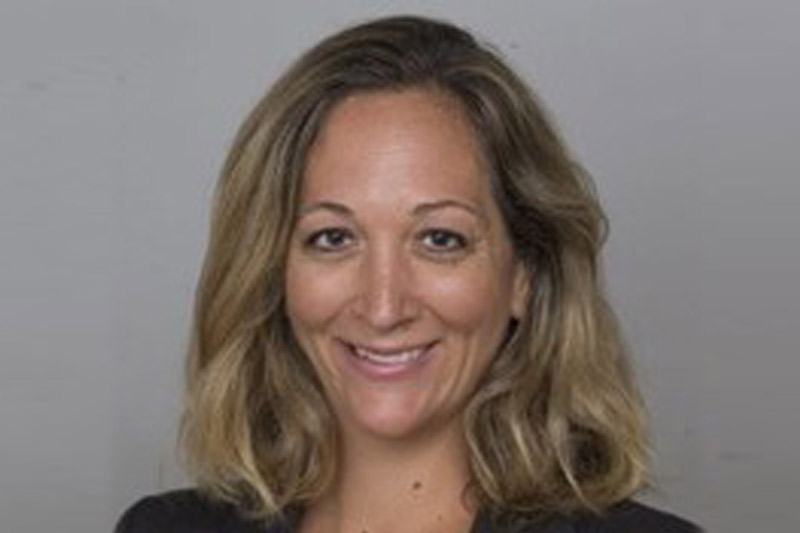Political appointments can be controversial, especially in this day and age. Yet when TC nutrition education program alumna Kate MacKenzie was named to New York City’s top nutrition post in early October, leaders across the city’s public, nonprofit and education sectors concurred with Mayor Bill de Blasio’s declaration that “New Yorkers are lucky to have Kate working on their behalf to advance bold ideas that will transform access to healthy and sustainable food across the five boroughs.”
MacKenzie (M.A. ’02) is “a big thinker and skilled implementer,” and a “stellar choice” to serve as Director of the Mayor’s Office of Food Policy, said Joel Berg, CEO of Hunger Free America.

Kate MacKenzie (M.A. ’02) (Photo courtesy Kate MacKenzie)
Karen Washington, a community leader and food advocate who founded Rise & Root Farm said that “it is about time the city selected someone who has been on the frontlines advocating for food as a basic human right,” adding, “Kate has been there. She knows the politics behind a food system that is complex and not one-dimensional in its problems or solutions. She will support and advocate for the most vulnerable population in our city.”
And Rachel Sabella, Director of No Kid Hungry New York, called McKenzie “a proven leader in the anti-hunger community in New York City” who possesses a “deep understanding” of the city’s food programs and other nutrition resources.
At Teachers College, where MacKenzie received her master’s degree from the Program in Nutrition, and where she later was an instructor in its community nutrition course, there was a lot of celebration – but very little surprise.
Isobel Contento, TC’s Mary Swartz Rose Professor of Nutrition & Education, said she spotted something long ago that foreshadowed MacKenzie’s emergence as a leader in the field of nutrition and policy.
“She always showed so much initiative,” Contento recalled. “When she was working on a project for me, if there was something she needed to know she wouldn’t immediately come to me, but she’d always take the initiative to find it on her own. She has a solid understanding of nutrition and its role in shaping food policy.”
“I think it’s not an accident that someone from our program wound up being Director of Food Policy,” said Pam Koch, Nutrition Program Research Associate Professor and Executive Director of TC’s Laurie M. Tisch Center for Food, Education & Policy. “We take a broad outlook encompassing policy issues, sustainability issues and social justice issues. And that’s what the city director’s job demands.”
MacKenzie, for her part, regards herself as part of “the continuing legacy of the comprehensive Teachers College approach to food, health and nutrition.”
The life-changing course for me was the Nutritional Ecology class taught by Joan Gussow. It was mind-blowing to learn about corporate consolidation in the food system, factory farming and the implications of population growth on food supply. And it was learning how the deck is stacked against so many people, in so many ways, that has motivated me to do this work.
—Kate MacKenzie
“The life-changing course for me and I’d dare say 98 percent of Nutrition Program graduates, was the Nutritional Ecology class taught by [Professor Emeritus of Nutrition & Education] Joan Gussow,” she said in a telephone interview this past week. “The complexity of the food system exposed and really terrified many students. It was mind-blowing to learn about corporate consolidation in the food system, factory farming and the implications of population growth on food supply. And it was learning how the deck is stacked against so many people, in so many ways, that has motivated me to do this work.”
MacKenzie came to the Mayor’s office from City Harvest, the food rescue non-profit where, as Director of Policy and Community Engagement and other capacities, she was in the forefront of creating strategies to define food security and the development of public policy around nutrition.
She also led an alliance of 80 New York City non-profits that advocated on behalf of the 2010 reauthorization of the federal Child Nutrition Act, as well as a consortium of public health professionals in an evidence-based campaign to influence national and state Farm Bill policies.
In her new role, MacKenzie has vowed to energize the City’s efforts to increase food security, increase ways to access healthy food, and expand the dynamic work of connecting food policy to environmental sustainability. One of her first tasks has been to attend, in Monpellier, Vermont, the Milan Urban Food Policy Pact, a coalition of more than 200 global cities, where she presented on New York City’s important initiatives to develop a responsible circular food economy.
As the administration official who oversees the city’s Good Food Purchasing program, which distributes over 238 million healthy and sustainable snacks and meals at city agencies and public schools, MacKenzie also plans an early focus on the procurement of food with public funds.
Changing systems isn’t just about low cost. It is about procuring healthful food from regional sources whenever possible, making space for small food operators and making sure suppliers pay employees fair and equitable wages.
—Kate MacKenzie
“It would be massive to shift the way the city buys food,” she said. “Changing systems isn’t just about low cost. It is about procuring healthful food from regional sources whenever possible, making space for small food operators and making sure suppliers pay employees fair and equitable wages.”